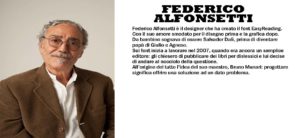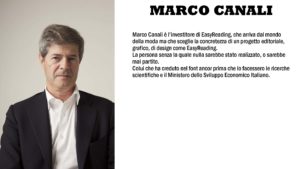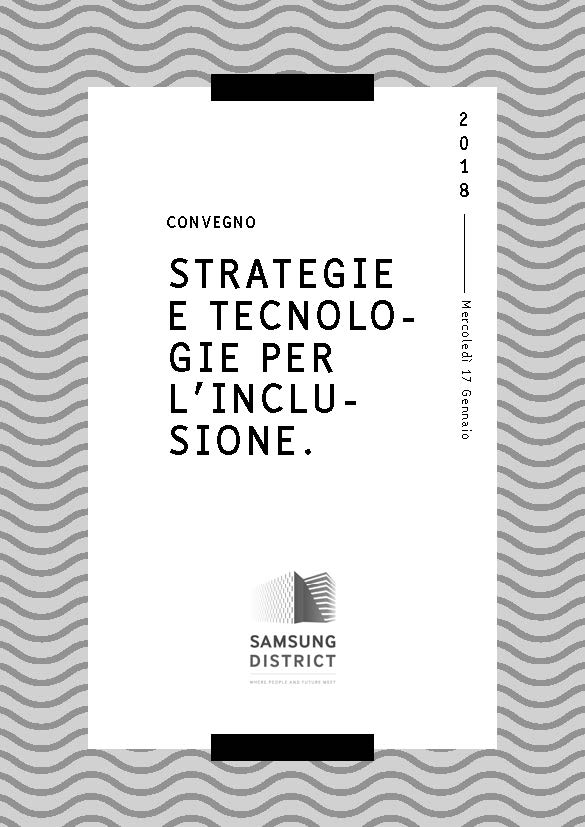A conference to talk about dyslexia in the world of employment, sponsored by AID (Italian Dyslexia Association), FID (Italian Dyslexia Foundation) and by the Milan Municipal Authority. The weekly magazine Donna Moderna is a media partner in this initiative.
Milan, 16 January 2018 – In Italy, around 3 per cent of children and adolescents are dyslexic. Dyslexia is a Specific Learning Disability (SLD), as recognised by a law (Italian law no. 170 of 8 October 2010) which defines it, safeguards the rights to study for children with SLD and gives schools guidelines for reflection on teaching methods. After years of study a lot of progress has been made, but, on finishing school, what guarantees exist for inclusion of these young people in the world of employment? Are companies prepared to welcome them?
To create a forum on these issues, today at 16.30 hrs in the Smart Arena of the prestigious Samsung District in Milan, a conference is being held, entitled “Strategies and technology for inclusion”, with the sponsorship of the Italian Dyslexia Association (AID), the Italian Dyslexia Foundation (FID) and the Milan Municipal Authority. Donna Moderna, the weekly magazine of the Gruppo Mondadori publishing group, managed by Annalisa Monfreda, is a media partner of this initiative.
The aim is to create a moment for exchange of views, to promote and disseminate the culture of inclusion. Sergio Messina, an infant neuropsychiatrist and President of the Italian Dyslexia Association (AID) stated: “There is still a long way to go to achieve scholastic and social inclusion for children with SLD, but at the same time we have already come a long way as an Association, achieving fundamental results over the last 20 years of activity, including the passing of the law no. 170/2010, the first to recognise and safeguard the rights to study of those with SLD, through the use of compensating instruments, amongst other things”. The conference will focus on the experiences gained in the areas of school and employment in Italy, with an overview of the international scenario and specific reference to the Anglo-Saxon context.
These are examples of virtuous inclusion, where technology plays a leading role. “The aim of Samsung is to improve the experience and life of people through leading edge solutions, capable of inspiring the world: one of our priorities is, indeed, that of placing our technological know-how at the disposal of society, to face the greatest variety of needs. We are aware of how technology can be a powerful instrument of social emancipation and inclusion and we have laid our hands on various projects which we have developed over recent years, for example the activity of School in Hospital”, commented Antonio Bosio, Product & Solutions Director of Samsung Electronics Italy.
Technology alone, however, is not enough. It is “the instrument” for helping people with dyslexia to overcome their difficulties, but the engine for change is correct information. For this reason, Donna Moderna, a magazine which has always been sensitive to social issues, is following the issue of dyslexia with ad hoc projects (such as longform on their website www.donnamoderna.com/news, created jointly with Lancôme and AID) and has taken part in the idea of the conference. «Dyslexia involves almost 2 million people and 350 thousand families of children of school age in Italy. These families find themselves facing diagnoses that are often conflicting, with teachers who do not always have the right tools in support and children who suffer genuine crises of self-confidence: misunderstood, not part of a real project of inclusion and not appreciated», stated the director Annalisa Monfreda.
The conference arises from an idea of Gabriella Schiavone, editor of the section entitled “dyslexia and surroundings”, within the public literature competition “Una Città Che Scrive” (A City that Writes), which was planned by Giovanni Nappi. This award, set up in Casalnuovo di Napoli, includes a special section in its edition of 2018 dedicated to specific learning disabilities. “In every stage of our award the power of writing shows through. Writing becomes, in A City that Writes, an instrument of individual and social redemption. It becomes a form of inclusive culture. With the Special Section for dyslexia, and with the parenthesis for our autistic friends and the painting competition wholly reserved for them, we are counting on observance of the noblest principles of social inclusion”, stated Giovanni Nappi.
The speakers include, Pierfrancesco Majorino, Councillor for Social, Health and Rights Policies, of the Municipal Authority of Milan; IBM Italy and Axia, two of the first Italian companies to adopt the Dyslexia friendly label. The speakers attending the conference are originators and proponents of the EasyReading font, which guarantees legibility for everyone, including those who are dyslexic; the materials handed out on Wednesday 17 January during the conference will therefore feature this highly accessible font.
There will also be contributions from lecturers and researchers and testimonies from young students successfully integrated as shining examples in the world of employment. A robotics workshop, for a limited number of children, with augmentative communications methods will be available for children. The event is free of admission charge, but there is a limited number of places: booking is required at https://milano.aiditalia.org
Federico Alfonsetti and Marco Canali – Designer and Investor – EasyReading Multimedia, as from 17.15 hrs, will lead an analysis of the new font for people with dyslexia, created to make reading easier

Federico Alfonsetti is the designer who created the EasyReading font, with his unashamed love first of drawing then for graphics. As a child he dreamed of being Salvador Dalì, before becoming the father of Giulio and Agnese. He started working on the font in 2007, when he was just an ordinary publisher: he was asked to publish books for people with dyslexia and he decided to get to the bottom of the question. The origin of all this was an idea of his mentor, Bruno Munari: designing means proposing a solution for a given problem.

Marco Canali is the EasyReading investor, who comes from the world of fashion but chooses the concreteness of a publishing, graphics and design project like that of EasyReading. He is the person without whom nothing would have been created, or even started. It was he who believed in the font before scientific research did so and also before the Ministry of Italian Economic Development.

